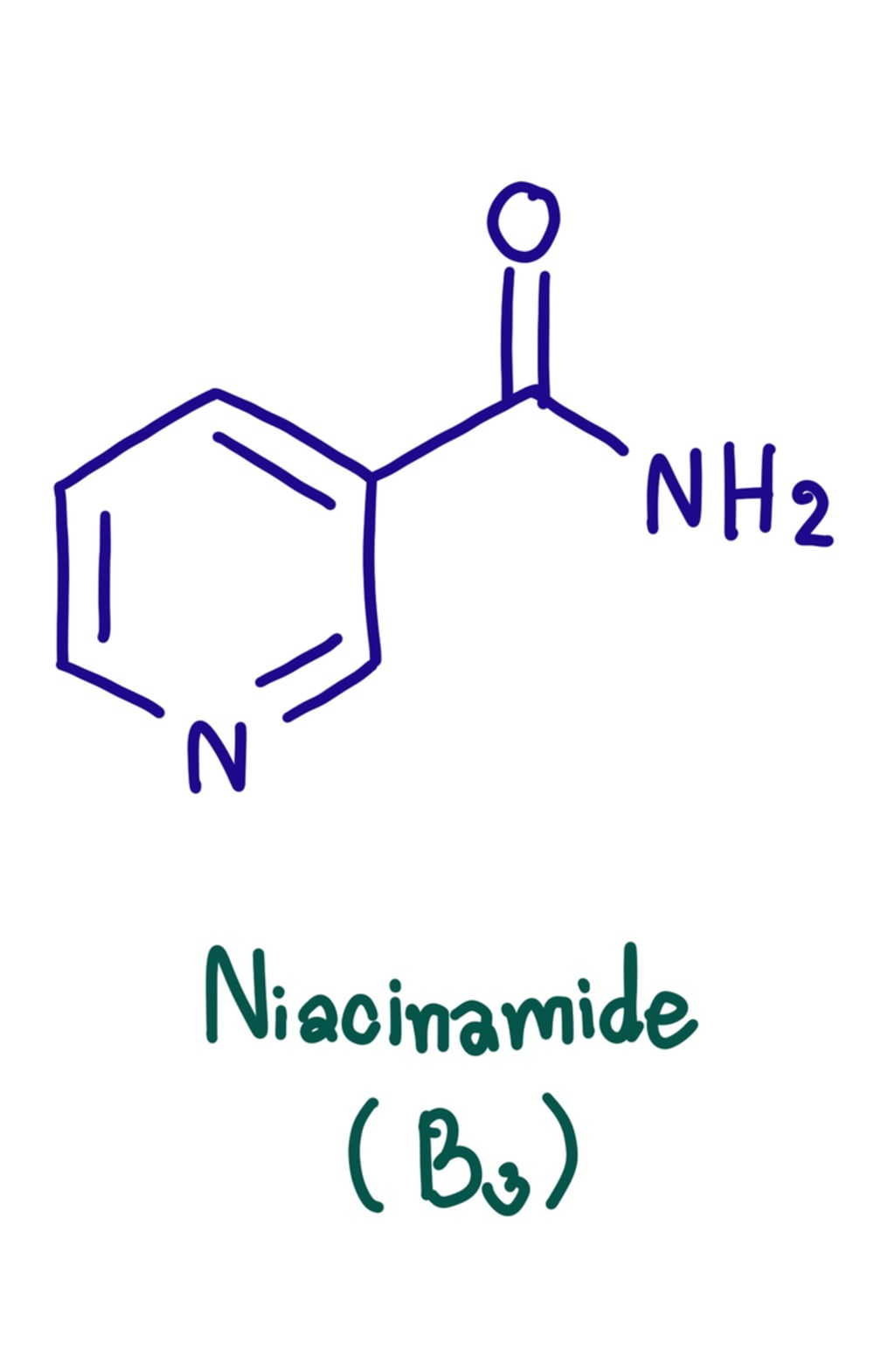
What Is Niacinamide?
Niacinamide is one of the two forms of vitamin B3, the other form being Nicotinic acid. Vitamin B3 is also known as Niacin. Niacinamide and Nicotinic acid also provide vitamin B3 activity. But they can differ in their chemical makeup and how they affect your health. Niacinamide is a form of vitamin B3 (Niacin), one of the eight B vitamins your body needs for good health. Vitamin B3 plays a vital role in converting the food you eat into usable energy. It also helps body cells perform important chemical reactions. Since it is water soluble, your body does not store this vitamin, so foods containing Nicotinic acid or Niacinamide should be consumed daily.
What Are the Benefits of Niacinamide?
Niacinamide can help create a protein and (lipid) barrier in the skin and lock in moisture to prevent environmental damage. In general, the benefits to the body include:
Immunity: Niacinamide helps create a type of protein for keratin that keeps your skin tight and healthy.
Lipid Barrier: Niacinamide can help your skin develop a ceramide (lipid) barrier, which can help retain moisture. This is especially beneficial for those with eczema or dry skin and all other skin types.
Minimizes Redness and Blemishes: Niacinamide can help alleviate redness caused by eczema, acne, pimples and other inflammatory skin conditions.
Minimizes Pore Appearance: Has a secondary benefit in keeping skin smooth and hydrated. It provides a natural reduction in pore size over timeand visibly reduces the appearance of pores on the skin.
Minimizes Fine Lines and Wrinkles: Research also shows that Niacinamide concentrations help reduce some of the signs of sun damage (the appearance of wrinkles and blemishes caused by UVA and UVB rays) that come with aging. This includes fine lines and wrinkles.
Protects Against Oxidative Stress: Niacinamide helps to form cells in the skin while protecting them from environmental stresses such as sunlight (UVA, UVB), air pollution and toxins.
Anti-Acne Effects: Niacinamide can be helpful in severe acne, especially in inflammatory forms such as papules and pustules. It helps you see fewer lesions and improved skin texture over time.
Regulates Oil: The benefits of retaining moisture are not just for those with dry skin types. Niacinamide also helps regulate the amount of production of the sebaceous glands and prevent the sebaceous glands from working excessively.
Protects Against Sun Damage: Niacinamide also supports the regeneration of healthy skin cells. It also protects them from damage caused by ultraviolet rays.
Effects Against Hyperpigmentation: Some research shows that Niacinamide concentrations are helpful in lightening dark spots and sunspots.
Can Niacinamide Help Prevent Melanoma?
Melanoma is a serious type of skin cancer that develops in cells that produce melanin, the pigment that gives your skin its color. Exposure to ultraviolet (UV) radiation from the sun or tanning beds (tanning beds) damages your cells' DNA over time and is strongly associated with Melanoma. Because of its role in keeping your cells healthy, oral (in pill form) Niacinamide supplements have been shown to increase DNA repair in ultraviolet (UV) damaged skin in humans. Therefore, Niacinamide is a promising supplement that may protect against Melanoma, especially in high-risk populations such as people who have previously had non-Melanoma skin cancers.
Are Niacinamide and Niacin the Same Thing?
Despite the similarities in the names, Niacinamide is not the same thing as Niacin. In fact, they're both different types of vitamin B-3. However, your body can make Niacinamide from the Niacin supplements you take. This condition occurs when there is an excessive amount of Niacin in the body. Tryptophan in the body can also be converted to Niacinamide. Before taking vitamin B-3 or other supplements, you should consult a doctor.
What Are The Side Effects and Harms of Niacinamide?
Niacinamide is generally well tolerated at appropriate doses. Because when taken in large amounts, it can be excreted through urine. The tolerable upper limit of vitamin B3 is 35 mg per day. However, this may result in the side effects of Nicotinic acid, not Niacinamide. Redness, itching and tingling of the skin are the most common symptoms.
Other Nicotinamide-related side effects may also occur, such as stomach upset, nausea, and headache.
As soon as you notice any of these symptoms, stop using the product and consult a doctor.






Comments
There are no comments for this story
Be the first to respond and start the conversation.